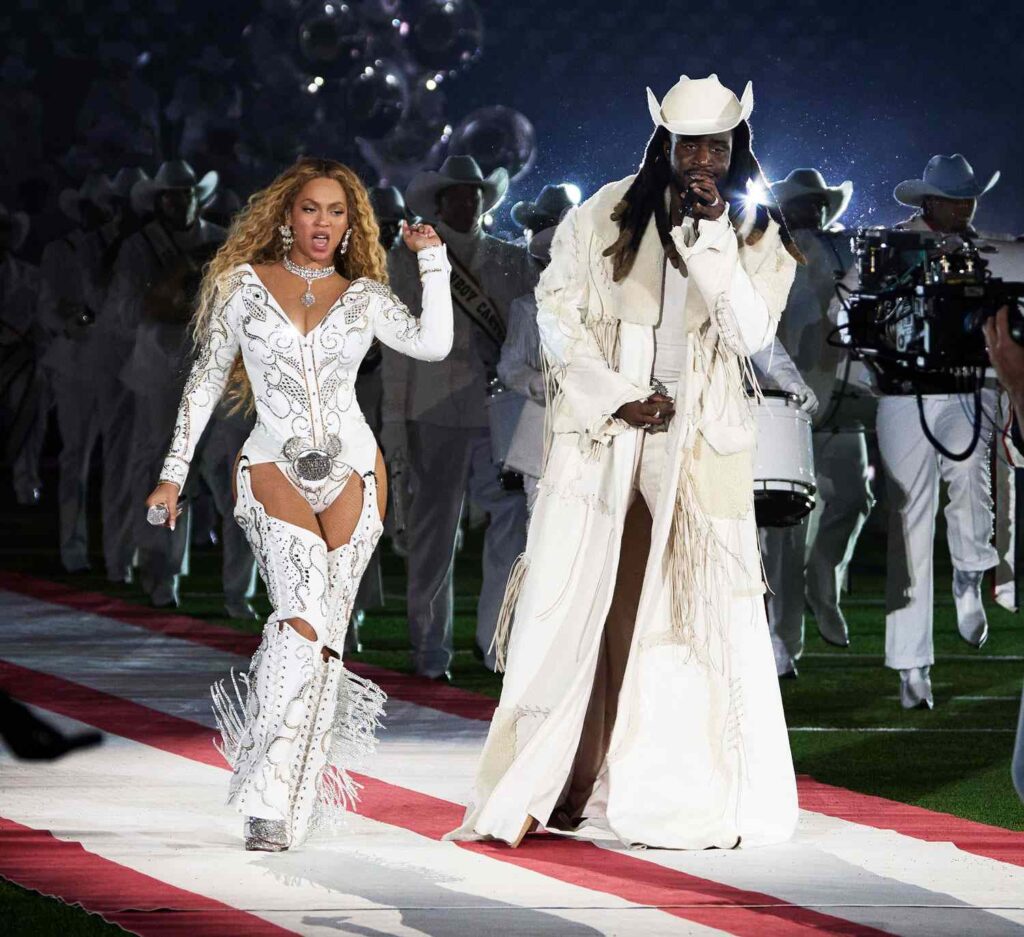In the rapidly evolving landscape of music, few stories feel as electric, unexpected, and timely as that of Shaboozey. The Nigerian-American artist has not only stormed the charts with his breakout hit “Tipsy (A Bar Song),” but also etched his name into music history through a groundbreaking collaboration with none other than Beyoncé. For Shaboozey, 2024 was a year of firsts, fire, and finding his place in the cross-section of genres that have long resisted change.
As fans and critics alike begin to recognize the gravity of his emergence, it’s clear: Shaboozey is not just riding a wave—he’s redefining what’s possible in popular and country music.
When Beyoncé dropped her eighth studio album, Cowboy Carter, on March 29, 2024, it wasn’t just another bold step in her own genre-spanning journey. The album signaled something bigger—an opening of the gates. And on two standout tracks, “Spaghettii” and “Sweet Honey Buckiin’,” listeners heard a new voice layered in with one of music’s most iconic.
That voice belonged to Shaboozey.
His inclusion on Cowboy Carter didn’t just spotlight his artistry; it cemented his place at the table. But as he shared recently on The Rebecca Judd Show on Apple Music 1, the process of landing those coveted features wasn’t typical.
“I wasn’t actually in the studio with Beyoncé,” Shaboozey revealed. “I know how it gets, you want to be locked in and focused when you’re finishing your album.”
Instead, he worked in an adjacent studio, crafting his verses while legendary producers like Raphael Saadiq and The-Dream floated through the space. Despite the separation, his impact was immediate and unmistakable.
“I remember when I did ‘Spaghettii,’ I looked at the engineer and said, ‘This is crazy,’” he recalled. “I was like, this is the one right here. I feel like everyone else maybe liked the other one, but I was like, nah, she’s going to hear this one and get it. You know what I mean? And I feel like she probably heard it and got it.”
What’s more remarkable is that none of his recordings were altered in the final mix.
“Everything I recorded, they kept in there, which I thought was beautiful,” he added. “I’m really huge on respecting an artist. I think everything I did, they just kept it in there.”
For an emerging artist, having Beyoncé trust your raw contributions is a validation few receive. And for Shaboozey, it wasn’t just a feature—it was a career-defining moment.

While the Beyoncé collaboration was monumental, Shaboozey’s own single, “Tipsy (A Bar Song),” was an unstoppable force. Blending country storytelling with hip-hop cadence and a catchy reimagining of J-Kwon’s early 2000s party anthem, Tipsy became the kind of song you couldn’t escape—in the best way possible.
It soared to the top of the Billboard Hot 100 and stayed there, eventually becoming the longest-leading No. 1 song on the chart by a solo artist. Even more significantly, it made Shaboozey the first Black male artist to simultaneously top both the Hot 100 and Billboard’s Hot Country Songs chart.
Beyond the accolades and streaming numbers, the song connected on a deeper level.
“I think when you listen to the song, it definitely has that emotion in there,” he said in the same interview. “People can relate to that.”
Indeed, Tipsy managed to sound both nostalgic and fresh, fun and layered. It encapsulated the duality of Shaboozey’s artistry—his ability to pull from Southern storytelling while remaining rooted in hip-hop’s pulse.
To understand the gravity of Shaboozey’s rise, you have to understand the landscape he’s entered. Country music, traditionally viewed as a genre resistant to change, has long been criticized for its lack of diversity and innovation. In recent years, however, artists like Lil Nas X, Mickey Guyton, and now Shaboozey have begun to crack the genre’s long-sealed doors.
Shaboozey, however, isn’t just stepping into country music—he’s reshaping it.
His presence on Cowboy Carter, which also features Linda Martell (a trailblazing Black woman in country music from the 1970s), adds a generational layer to the conversation about inclusion. The song “Spaghettii,” nominated for Best Melodic Rap Performance at the 2025 Grammy Awards, serves as a genre-bending manifesto: bold, experimental, and culturally rich.
Shaboozey’s own music follows suit. By fusing guitar-driven instrumentals with 808 beats, he’s creating a new lane—one where the saloon meets the studio, and country’s dusty boots walk alongside hip-hop’s gold chains.
And he’s not asking for permission.
As if chart-topping hits and Beyoncé features weren’t enough, Shaboozey capped off his 2024 with five Grammy nominations, including a performance slot at the 2025 awards ceremony. It was both a celebration and a moment of reckoning for an industry often slow to recognize cross-genre artists of color.
For Shaboozey, the recognition was gratifying, but not unexpected. In interviews, he’s made it clear that he sees himself not just as a trend, but as a movement.
“I want to be remembered not just as a guy who had a big song,” he’s said. “I want to build a legacy. I want to inspire others to push past boxes, to make music that lives longer than the moment.”
The Grammys might have marked the end of an incredible year, but they also signaled the beginning of something even bigger.
At the heart of Shaboozey’s success story is a deep sense of self-awareness, humility, and creative fire. Born Collins Chibueze, he’s never shied away from his Nigerian roots. In fact, his artist name—Shaboozey—emerged from a mispronunciation of his last name (Chibueze), which means “God is king” in Igbo.

Growing up in Virginia, Shaboozey was surrounded by different sounds, cultures, and expectations. He initially wanted to be a novelist, and that literary mindset still shapes his lyrics today—each song a short story, each hook a punchline.
Despite his meteoric rise, he hasn’t forgotten where he came from. His journey is peppered with gratitude: for his parents, who were initially skeptical of his musical ambitions; for his mentors, who gave him studio access; and for fans, who embraced his unconventional sound without hesitation.
With one of the biggest years in modern music history behind him, the question now becomes: what’s next for Shaboozey?
“I just want to keep evolving,” he said. “I’m not interested in staying in one lane. I want to explore, experiment, and inspire.”
There are rumors of a world tour in the works, along with plans for a new album that dives even deeper into the fusion of genres he’s mastered. He’s also expressed interest in fashion, film, and launching his own creative label—hinting at a future where his impact goes far beyond music.
But whatever comes next, one thing is certain: Shaboozey isn’t done making history.
In the span of just one year, Shaboozey went from rising talent to cultural phenomenon. With collaborations that stretched boundaries, a smash hit that dominated the charts, and a sense of purpose that transcends genres, he has become a beacon for a new generation of artists and fans.
2024 wasn’t just a breakthrough for Shaboozey—it was a recalibration of the music industry itself. An invitation to reimagine what country, hip-hop, and pop can be. And as the artist himself steps confidently into the spotlight, guitar in hand and mic at the ready, the world is finally catching up to his vision.
So whether you first heard him on Cowboy Carter, belted out Tipsy in your car, or watched him light up the Grammys stage—know this: Shaboozey isn’t a moment.










